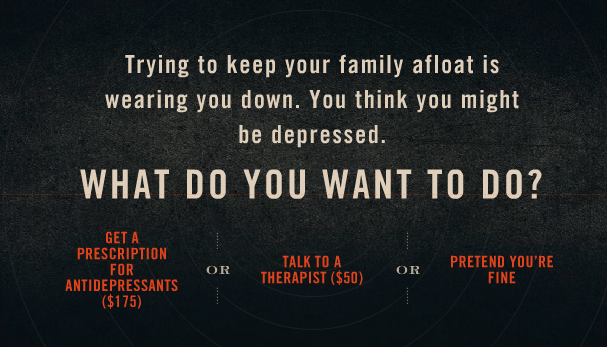Future Now
The IFTF Blog
Simple Games and the Future of Empathy
A great game called Spent has gotten a fair bit of attention for its incredibly simple yet powerful simulation of life below the poverty line. The concept is pretty simple: You work a minimum or near minimum wage job, and do your best to make every day decisions about life--and offers a great early signal of ways that technologies are being redesigned to create empathy and build social understanding across boundaries.
Writing in Technology Review, Christopher Mims has my favorite description of the experience:
I've been unemployed for just one month, and already I've sent my only child to school crying because other kids make fun of him for being on the free lunch program, driven away from a fender bender with a parked car because I didn't have the money to pay for the accident (luckily no one was around), been fired from my temp job for talking to a union organizer, put my kid's dog to sleep because we couldn't afford its medical care, and applied for food stamps—which won't arrive until next month.
From the beginning of the process, where you have to choose between buying health insurance for a quarter of your monthly income, or going uninsured, Spent effectively immerses people into the everyday decisions and challenges that come with poverty. Every decision feels tense, and no matter what you choose, nothing seems to have a particularly good outcome.
One of the really astonishing things about these tradeoffs is how frequently health decisions are involved:

A lot of the challenges are like this--you're in a situation where in theory, you can act, but the immediate financial cost of doing something makes it possible to take care of yourself and family over the long-run. You have to figure out if you should let your kid get made fun of for accepting free lunch or pay for him to eat; you have to decide whether to pay for dental care or ignore your need for a root canal. It becomes very clear, very quickly, that doing anything for your long-term health and security is much more difficult and expensive than making a short-term choice.
For people in the health world, it's not only instructive for thinking about many of the health challenges people face, but also helpful for thinking about opportunities to improve health and well-being over the next decade.
Beyond the specifics of the game, I think Spent offers an early signal of something I wrote about a few months ago: The idea that over the next decade, one of our big opportunities and challenges with technology will be to use them to enable people to imagine the lives and situations of others. While not the experience of any one individual, it's an incredible example of using technology to simulate and share different kinds of experiences in order to break us out of our traditional relationships and understandings, and give us windows into other peoples' lives.



